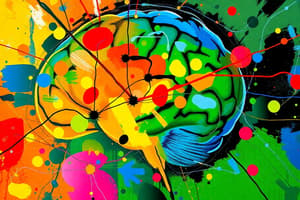Podcast
Questions and Answers
What is the recommended duration to establish a regular study schedule?
What is the recommended duration to establish a regular study schedule?
- 2-3 days (correct)
- 4-5 days
- 1 week
- 1-2 days
Which type of test is deemed more effective for studying purposes?
Which type of test is deemed more effective for studying purposes?
- Multiple-choice tests
- Open-ended short answer tests (correct)
- True/false tests
- Fill-in-the-blank tests
What role does emotion play in the studying process?
What role does emotion play in the studying process?
- It facilitates the forgetting process.
- It is irrelevant to learning.
- It hinders memory recall.
- It greatly enhances memory retention. (correct)
What is the significance of gap effects during study sessions?
What is the significance of gap effects during study sessions?
Which learning outcome is characteristic of mastery of information?
Which learning outcome is characteristic of mastery of information?
Which of the following mechanisms contributes to neuroplasticity by adding new neurons?
Which of the following mechanisms contributes to neuroplasticity by adding new neurons?
What is the primary benefit of regularly testing oneself on study material?
What is the primary benefit of regularly testing oneself on study material?
Which strategy is NOT considered an effective study habit for successful students?
Which strategy is NOT considered an effective study habit for successful students?
Which sleep stage is particularly important for strengthening the connections formed during learning?
Which sleep stage is particularly important for strengthening the connections formed during learning?
What is the purpose of the 'Watch, Do, Teach' learning pattern?
What is the purpose of the 'Watch, Do, Teach' learning pattern?
How does mindfulness meditation contribute to learning effectiveness?
How does mindfulness meditation contribute to learning effectiveness?
Active engagement in learning primarily involves which of the following?
Active engagement in learning primarily involves which of the following?
Which of the following best describes Non-Sleep Deep Rest (NSDR)?
Which of the following best describes Non-Sleep Deep Rest (NSDR)?
Study Notes
Learning is Not Intuitive
- Learning best practices are often counter-intuitive, even for those who teach and have learned for many years. This discrepancy arises because traditional beliefs about learning do not always align with empirical research on how the brain processes and retains information.
- Most of what people believe about the best ways to study are incorrect. For example, many individuals still cling to the idea that simply rereading notes or cramming before an exam is sufficient for deep learning. In reality, effective study strategies involve a deeper understanding of the brain's memory systems and how information is interconnected.
Neuroplasticity
- Neuroplasticity is the ability of the nervous system to change in response to experience. This process is fundamental to learning and memory as it allows the brain to reorganize itself by forming new neural connections throughout life.
- Three mechanisms underlie neuroplasticity:
- The strengthening of connections between neurons occurs through repetitive activation, allowing the brain to become more efficient at accessing and utilizing learned information.
- Weakening of connections between neurons can happen when certain pathways are not used frequently, leading to a more efficient neural network by eliminating unnecessary connections.
- Neurogenesis refers to the addition of new neurons, particularly in areas such as the hippocampus, which plays a crucial role in the formation of new memories.
Why Testing is Crucial
- Testing oneself is critical for learning and remembering information. The act of retrieval itself strengthens memory pathways and reinforces learning.
- Regularly testing yourself on material enhances retention and offsets forgetting. This not only ensures that you have grasped the content but also helps in transferring knowledge into long-term memory.
Neuroplasticity: Learning and Sleep
- Learning is a two-step process involving:
- Active engagement and focus: Attending to information triggers neural changes for retention. When individuals are fully present and engaged, their brain is better equipped to make connections and store new information.
- Sleep: Deep sleep and REM sleep facilitate the strengthening and weakening of connections for learning. During these stages, the brain consolidates memories and enhances the learning experience.
Study Habits of Successful Students
- Schedule Time: Setting aside time for studying, even breaking it into shorter sessions, helps eliminate distractions and fosters consistent effort. It creates a routine that primes both the brain and body for learning.
- Eliminate Distractions: Turning off phones and isolating oneself during study sessions optimizes focus. A distraction-free environment allows for deeper concentration and better retention of information.
- Teach Others: Explaining concepts to peers improves understanding and solidifies knowledge. Teaching forces the learner to process the information at a higher level, reinforcing their own understanding.
- Watch, Do, Teach: This pattern (watch one person, do it yourself, then teach it to someone else) is highly effective for acquiring skills. It incorporates observation, practical application, and peer-to-peer instruction, creating a well-rounded learning experience.
- Adequate Sleep: Sleep is critical for consolidating learned information and enhancing neuroplasticity. Sufficient rest allows the brain to process and retain information studied earlier, making it easier to recall and apply later.
Focus and Attention Hacks
- Mindfulness Meditation: Regular meditation, just 5-10 minutes a day, improves focus, memory, and learning. Mindfulness techniques help in cultivating awareness and reducing mental clutter, enhancing the learning process.
- Non-Sleep Deep Rest (NSDR): A 10-20 minute relaxation technique to boost neuroplasticity for better learning. This practice helps in refreshing the mind and body, allowing for better absorption of information during study periods.
Optimal Studying Strategies
- Active Learning: Actively engage your focus and attention with the material that you're trying to learn. This could include summarizing information in your own words, asking questions, or relating new information to what you already know.
- **Sleep Well:** A good night's sleep, especially on the first night after studying, is essential for memory consolidation. Sleep plays a pivotal role in transforming short-term memories into long-lasting ones.
Scheduling Study Time
- Regularly scheduled study times improve focus and attention. By creating a consistent study routine, you can train your brain to be ready to learn at specific times.
- The brain entrains to a regular schedule, making it easier to dive into studying efficiently when the time comes.
- It takes 2-3 days to establish a regular study schedule, allowing your brain to adjust and optimize for learning during designated times.
- Limit distractions and focus on the material. Creating an environment conducive to studying will enable you to engage more effectively with the material.
Motivation for Studying
- Effective medical students have a long-term understanding of how their success will impact their families and lives. This perspective can motivate them to persist through challenging study periods as they envision the future benefits of their hard work.
- They have an aspirational view of their study efforts, seeing themselves achieving their goals and fulfilling their potential. This positive mindset can significantly influence their study habits and outcomes.
The Importance of Studying
- Challenging study tasks are most effective for learning. Engaging with difficult material forces students to adapt and apply their knowledge, leading to better retention and understanding.
- Effort is crucial for learning. The deeper the engagement with the content, the more likely it is to be understood and remembered.
- Tests are not just for evaluation but for building and retaining knowledge. They serve as practice opportunities that reinforce learning and reveal areas that need improvement.
Self-Testing
- The use of self-testing is one of the most strongly supported tools for improving learning. By actively recalling information, students can assess their understanding and retention of the material.
- Self-testing is critical for offsetting the natural forgetting process, allowing for real-time gauge of learning progress and areas needing further review.
- Self-testing is more effective than rereading material, as the act of retrieval enhances memory more than passive review.
- Testing oneself shortly after exposure to new material is most effective at offsetting forgetting. This approach encourages the formation of lasting memories shortly after the learning experience.
Types of Tests for Studying
- Open-ended short answer tests are more effective than multiple-choice tests for studying. They require students to formulate responses based on their understanding rather than simply recognizing options.
- Multiple-choice tests that include "trick" questions can be effective if they require greater mastery of the material. Such questions encourage students to think critically and apply their knowledge rather than relying on memorization.
Other Key Components of Studying
- Emotion matters greatly when it comes to memory. Emotionally charged experiences enhance the likelihood of those memories being encoded and recalled later.
- Emotionally laden experiences are remembered more durably, as they often create stronger neural connections in the brain due to their significance.
- Incorporating stories and emotional emphasis enhances memory by making the material more relatable and vivid, allowing for better retention.
- "Gap effects," short pauses of 5-10 seconds or 30 seconds, allow the hippocampus to quickly repeat information. These brief breaks can enhance the processing of newly learned information, leading to improved recall.
- Interleaving information, integrating unrelated material with the learning material, enhances learning by encouraging the brain to make connections across different subjects.
Mastery of Information
- Unskilled: Limited understanding and use of information. Individuals at this level often have difficulty applying concepts outside of the contexts in which they were initially learned.
- Skilled: Ability to recognize and use information in basic and advanced ways. Skilled learners can apply knowledge in various contexts, demonstrating a greater degree of comprehension.
- Mastery: Full depth of knowledge that can be applied flexibly. Mastery entails not only understanding the material but also being able to analyze and synthesize information creatively.
- Virtuosity: High mastery where information is used in unexpected and spontaneous ways. Those exhibiting virtuosity often innovate and adapt their knowledge dynamically, solving problems or creating new ideas effectively.
Studying That Suits You
Use AI to generate personalized quizzes and flashcards to suit your learning preferences.
Description
Explore the fascinating connections between neuroplasticity and effective learning strategies in this quiz. Understand how counter-intuitive practices and testing play crucial roles in memory retention. Dive into the science of learning and discover how the brain's adaptability can enhance educational outcomes.



